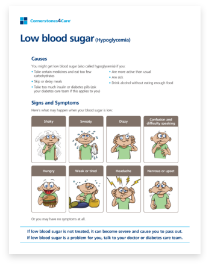Tresiba® side effects
The most common side effect of Tresiba® is low blood sugar (hypoglycemia). For most people, low blood sugar is when the amount of sugar in your blood drops to 70 mg/dL or lower. You should ask your diabetes care team what level of blood sugar is too low for you. Low blood sugar is something that you need to be prepared to treat, so it's important to know the signs.
Signs and symptoms that may indicate low blood sugar include:
These are not all the possible symptoms of low blood sugar. See the full list of symptoms below:
- Dizziness or light-headedness
- Sweating
- Confusion
- Fast heartbeat
- Blurred vision
- Slurred speech
- Shakiness
- Anxiety, irritability, or mood changes
- Hunger
- Headache
Treating Low Blood Sugar
You can treat low blood sugar by following the "Rule of 15."
- Eat or drink food with 15 grams of fast-acting carbohydrates
- Wait 15 minutes and test blood sugar again
- If it’s still low, eat or drink another 15 grams of carbohydrates
Blood Sugar Readings With Continuous Glucose Monitors
A continuous glucose monitor (CGM) is a small sensor inserted under the skin that measures blood glucose. The system can display real-time glucose levels at 1- and 5-minute intervals, and alarms can be set to alert patients of high or low glucose levels. This can help manage side effects related to hypoglycemia.
Talk to your health care provider about a CGM system. Discover the Dexcom CGM System or the FreeStyle Libre.
For a complete list of possible side effects of Tresiba®, see the Prescribing Information and Important Safety Information below.
For medical advice about side effects, talk with your health care provider. You may report side effects to the FDA at 1-800-FDA-1088.
In a large safety study vs Lantus® in adults with type 2 diabetes and heart disease, Tresiba® did not increase their risk of major cardiovascular events, such as heart attack, stroke, or death.
Patients taking Tresiba® also had a lower rate of severe low blood sugar, a possible serious side effect of insulin, compared to Lantus®.

